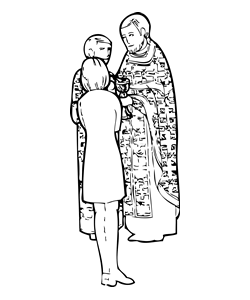|
|||
|---|---|---|---|
| This weekly bulletin insert complements the curriculum published by the Department of Christian Education of the Orthodox Church in America. This and many other Christian Education resources are available at http://dce.oca.org. | |||

A passage from Saint Paul's letter to the Ephesians offers us a chance to see how closely the prayers of the Divine Liturgy are based on the words of Scripture. The passage is Ephesians 3: 8-21. Like the rest of the letter to the Ephesians, these verses emphasize God's eternal plan to offer salvation and eternal life to every person. The Lord wants not only His chosen people, Israel, to find their way to the Kingdom, but the Gentiles as well. In fact, Paul begins the third chapter of the letter by referring to himself as "Paul, a prisoner for Christ Jesus on behalf of you Gentiles." In 3:8 Paul describes himself as "the very least of all the saints." The same recognition of personal unworthiness is reflected in the words of the Divine Liturgy. As the priest partakes of the bread and then the cup of Holy Communion, he says that the Most Holy Body and the Most Holy Blood of Jesus Christ are "given to me, the unworthy priest ......" and then inserts his own name. The Communion Prayer said by the congregation expresses a similar idea. Each person who is to receive the Eucharist confesses belief in Christ as the Son of the living God, who came into the world to save sinners, "of whom I am first" or "of whom I am chief." Some people wonder a little about these words. Do we really have to say that we are worse than everybody else? Surely there are people who have sinned more seriously than we have. But Paul's next words show us the true significance of these self-accusations. He writes that though he is the least of all the saints, "to me this grace was given, to preach to the Gentiles the unsearchable riches of Christ, and to make all men see what is the plan of the mystery hidden for ages in God who created all things." In other words, not only does God have a wonderful plan for us, but Paul has been given the grace to know the plan and to reveal it to others. The privilege of being given this grace is so overwhelming that Paul can only feel awe at its immensity and his unworthiness. In the prayers of the priest and the congregation receiving the Eucharist, the sense of privilege is the same. The priest and people are about to enter into the Mysteries of God Himself. They are about to be given the precious Body and precious Blood that are foretastes of life everlasting, of heaven itself. For them, as for Sant Paul, the only possible response is awe at the immensity of such a gift. That is why each person saying the Communion Prayer asks God to "make me worthy" to receive such a gift. No human being is capable of earning it. Each one of us is the first among sinners, but God offers Himself to us anyway. Saint Paul shares our wonder at such generosity and grace. |
|||
